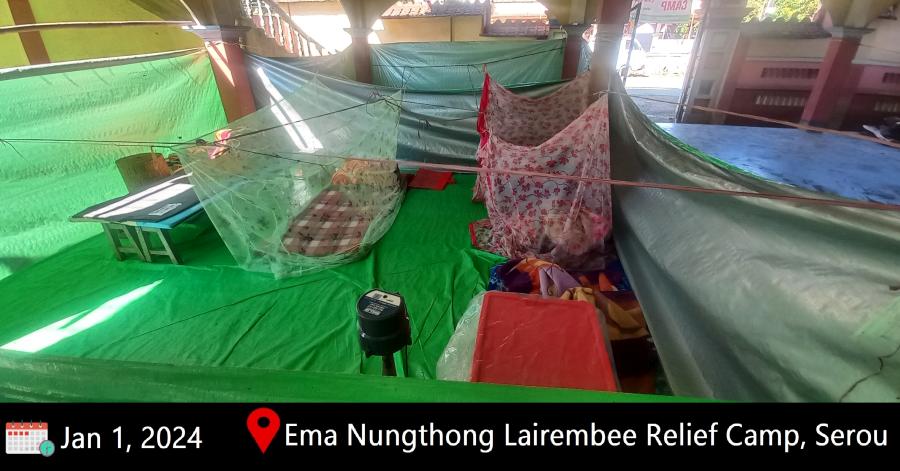Harsh reality of IDPs amidst political chaos
Takhellambam Nepolin *

Blankets & medicines distributed to IDPs at Ema Nungthong Lairembee Relief Camp, Serou on Jan 1 2024 :: Pix - Ringo Pebam
Manipur stands at a critical crossroad, grappling with political turmoil and the deepening ethnic conflict.
Over the past 22 months, people have been suffering under the dark shadow of Manipur's unending conflict, more than 60,000 people have been displaced, forced to live in relief camps—refugees within their homeland. Their suffering continues to grow, exacerbated by the prolonged instability and lack of decisive leadership.
In a significant but unsettling development, the Central Government has imposed President’s Rule. Despite holding a majority, the so-called "double-engine" BJP Government has failed to form a stable administration, leaving the State in political paralysis.
Instead of addressing the urgent humanitarian crisis, political leaders remain entangled in power struggles, wagering over the Chief Minister's post while the people of Manipur continue to suffer. Amidst this chaos, the internally displaced persons (IDPs) have turned to street vending—selling detergent, candles, and incense sticks—to sustain themselves.
In the early days of the crisis, there was an outpouring of sympathy, and many supported them out of humanitarian concern. However, as the conflict drags on, fatigue and frustration have set in, and now, many refuse to buy. But should the burden of survival fall on the displaced alone ? Are they to blame for their circumstances, or is this a reflection of a failed system ?
The prolonged displacement and uncertainty have pushed many IDPs into a state of despair, with rising cases of suicide and individuals being drawn toward harmful paths due to the loss of hope and shattered dreams. In today's world, selling a few items on the roadside is hardly enough to secure their children's education or rebuild a normal life.
Yet, despite their struggles, these displaced individuals continue to fight—not for themselves, but for their children's future. Their minds remain clouded by darkness, unable to envision a future, but their determination to return home and restart their lives remains unwavering.
While the Government has introduced various initiatives, they fall short of addressing the deep psychological trauma these families endure. More than relief measures, what they truly seek is the restoration of their dignity and a path back to their rightful homes.
For the past 22 months, they have suffered physically, mentally, and economically due to the conflict, and now they face yet another crisis: political instability. Countless people, including internally displaced persons (IDPs), have taken to the streets, demanding a resolution to the ongoing conflict.
The IDPs long to return home, while the people of Manipur call for peace. Yet, amidst these cries for unity, some voices push for Separate Administration. Meanwhile, the legislature remains entangled in a power struggle, prioritizing the race for the Chief Minister's post over the suffering of the people. Is this the true essence of leadership and representation ?
The legislators, elected by the people of Manipur to be their voice, must rise above political games and act decisively. This is not a time for personal ambition or power struggles; it is a time to lead with responsibility, compassion, and urgency.
The people they represent are suffering, and they have to serve—not to delay, but to act. IDPs are not just battling homelessness; they are fighting for dignity. They have lost their homes, livelihoods, and in many cases, their faith in the system.
The absence of political will to resolve the crisis has only worsened their plight. With President’s Rule in place, the time for excuses is over. The focus must shift from political gamesmanship to immediate action—ensuring the displaced's safe rehabilitation, security, and sustainable livelihood.
The people of Manipur deserve more than unfulfilled promises and political stagnation. It is time to place humanity above power, leadership above self-interest, and justice above negligence. If this disregard continues, a third crisis is inevitable, pushing Manipur towards a fate akin of a mini-Myanmar within the country.
The time to act is now—delays will only deepen the crisis. Protecting Manipur's youth and ensuring human security are imperative for strengthening National security. Failure to act will have far-reaching consequences for the Nation as a whole.
* Takhellambam Nepolin wrote this as a news article for The Sangai Express
This article was webcasted on March 04 2025.
* Comments posted by users in this discussion thread and other parts of this site are opinions of the individuals posting them (whose user ID is displayed alongside) and not the views of e-pao.net. We strongly recommend that users exercise responsibility, sensitivity and caution over language while writing your opinions which will be seen and read by other users. Please read a complete Guideline on using comments on this website.







